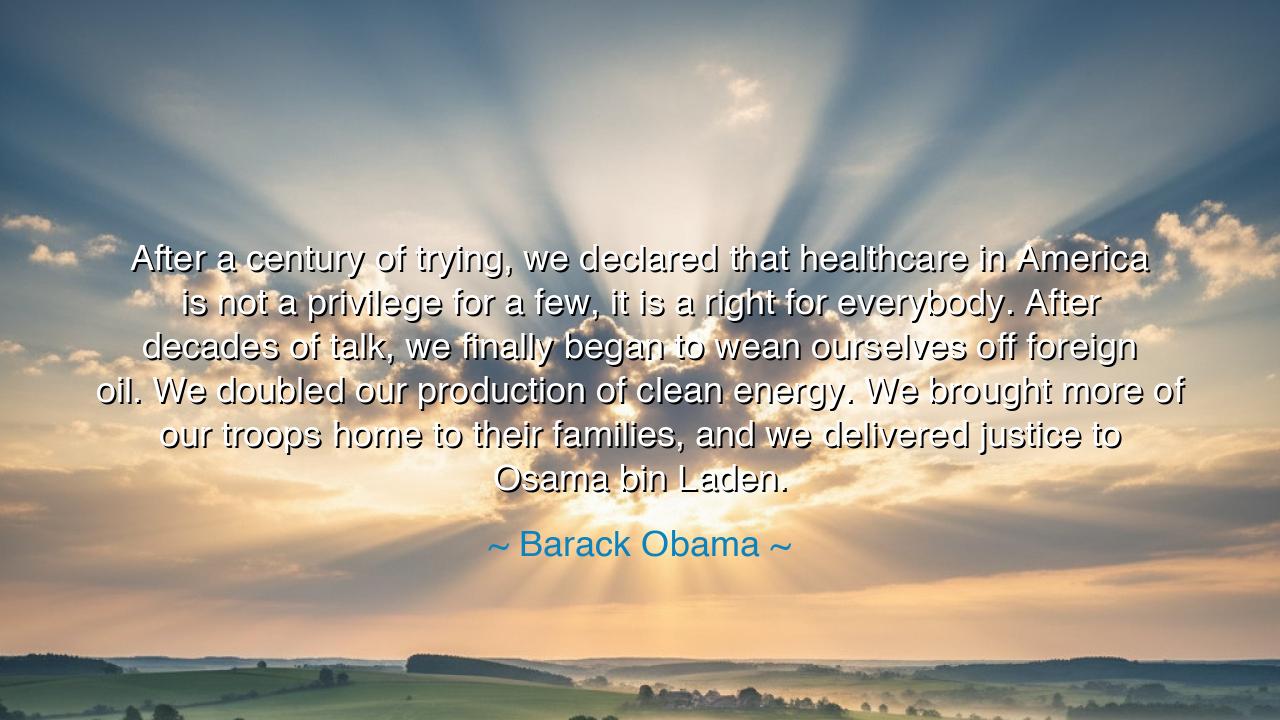
After a century of trying, we declared that healthcare in America
After a century of trying, we declared that healthcare in America is not a privilege for a few, it is a right for everybody. After decades of talk, we finally began to wean ourselves off foreign oil. We doubled our production of clean energy. We brought more of our troops home to their families, and we delivered justice to Osama bin Laden.






Hear the words of Barack Obama, spoken with the cadence of conviction and the calm strength of one who bore the weight of history: “After a century of trying, we declared that healthcare in America is not a privilege for a few, it is a right for everybody. After decades of talk, we finally began to wean ourselves off foreign oil. We doubled our production of clean energy. We brought more of our troops home to their families, and we delivered justice to Osama bin Laden.” These words, uttered in triumph and reflection, carry not the vanity of accomplishment but the echo of a long struggle—one that began generations before and will continue for generations to come. They are the words of a leader who understood that progress is never owned by one man, but by the hands and hearts of a people who refuse to yield.
The origin of this quote lies in President Obama’s address to the American people, reflecting on the milestones achieved during his presidency—moments that marked both political courage and moral endurance. These achievements—healthcare reform, energy independence, environmental stewardship, and national security—were not isolated triumphs, but the fruits of centuries of conflict between fear and hope, selfishness and solidarity. By calling healthcare a right, Obama did more than pass a law; he reaffirmed the belief that compassion is the truest expression of civilization. By urging the nation toward clean energy, he sought to align progress with the planet’s preservation. And by bringing soldiers home and delivering justice to an enemy of peace, he reminded the world that strength is not in conquest, but in the protection of life and liberty.
In the style of the ancients, these deeds might be spoken of as the trials of a republic standing at the crossroads of history. For every age faces its own hydra of challenges—many-headed, fierce, and regenerating. The fight for healthcare had begun long before Obama’s time, just as the struggle for equality and dignity has marked every chapter of America’s story. His words call to mind the great leaders of old—those who fought not for themselves, but for the collective good. Just as Pericles once proclaimed that Athens was great not for its walls but for its ideals, so did Obama remind his nation that America’s greatness lies not in its wealth, but in its justice and mercy.
His words also remind us that progress is not born of comfort but of courageous persistence. To say “after a century of trying” is to acknowledge the generations of dreamers, reformers, and ordinary citizens who dared to imagine a fairer world. Many never saw the fruits of their labor, yet they sowed the seeds of change that others would harvest. This echoes the wisdom of the prophets and philosophers of old, who taught that great societies are built not in haste, but through endurance. Just as farmers labor under the sun knowing they may never eat the full yield of their planting, so must citizens work for justice knowing that true transformation outlives the individual.
The mention of foreign oil and clean energy calls to mind another ancient lesson—that humanity must learn to live in balance with its world. The Greeks spoke of hubris, the sin of overreaching beyond nature’s harmony. So too has modern civilization often fallen prey to excess, taking from the earth without thought for its renewal. By striving for energy independence and sustainability, Obama’s words call humanity back to the wisdom of the ancients: that stewardship, not domination, is the path to survival. In this, his message is not merely political but spiritual—a call to gratitude, restraint, and reverence for creation itself.
And when he speaks of bringing troops home and delivering justice to Osama bin Laden, his tone is neither boastful nor vengeful, but resolute. Justice, as the ancients taught, is not vengeance; it is balance restored. To avenge suffering without becoming consumed by hatred is among the hardest virtues to uphold. Like the warrior-king David in the Scriptures or the philosopher-emperor Marcus Aurelius, Obama’s vision of leadership was tempered by empathy, understanding that peace is the ultimate goal of power, and mercy the crown of strength.
The lesson in his words is both simple and profound: progress is possible, but only through unity, patience, and moral clarity. Each of us, in our time, must continue the work of those who came before—lifting others, protecting the earth, and seeking justice not for the few, but for all. As the ancients said, the greatness of a nation lies in how it treats its most vulnerable. Thus, let us build not monuments of stone, but monuments of compassion and conscience.
So, children of tomorrow, remember this: every generation inherits both the triumphs and the unfinished labors of the past. Do not despair when progress seems slow, for every great victory once seemed impossible. Stand firm in your pursuit of justice, as Barack Obama and those before him stood firm in theirs. For history bends toward those who act not for glory, but for goodness—and the legacy of such action, like the light of a rising sun, outlives the hand that kindled it.






AAdministratorAdministrator
Welcome, honored guests. Please leave a comment, we will respond soon